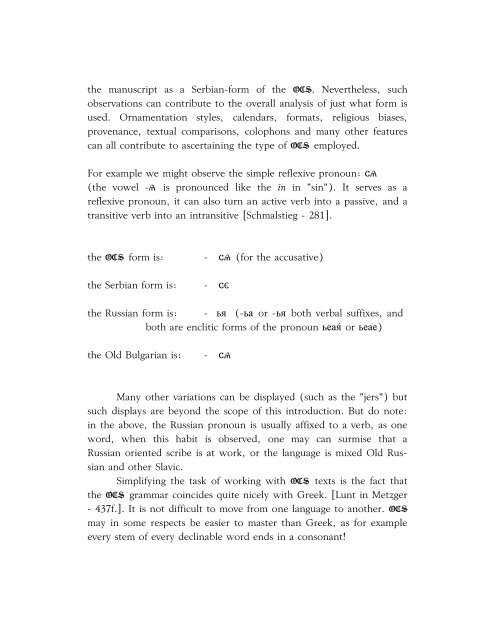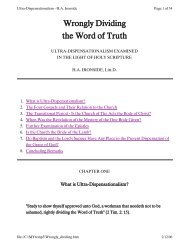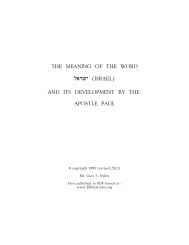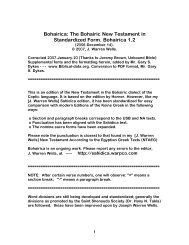OCS and the Greek New Testament - Biblical-data.org
OCS and the Greek New Testament - Biblical-data.org
OCS and the Greek New Testament - Biblical-data.org
Create successful ePaper yourself
Turn your PDF publications into a flip-book with our unique Google optimized e-Paper software.
<strong>the</strong> manuscript as a Serbian-form of <strong>the</strong> Ú. Never<strong>the</strong>less, such<br />
observations can contribute to <strong>the</strong> overall analysis of just what form is<br />
used. Ornamentation styles, calendars, formats, religious biases,<br />
provenance, textual comparisons, colophons <strong>and</strong> many o<strong>the</strong>r features<br />
can all contribute to ascertaining <strong>the</strong> type of Ú employed.<br />
For example we might observe <strong>the</strong> simple reflexive pronoun: s0<br />
(<strong>the</strong> vowel -0 is pronounced like <strong>the</strong> in in "sin"). It serves as a<br />
reflexive pronoun, it can also turn an active verb into a passive, <strong>and</strong> a<br />
transitive verb into an intransitive [Schmalstieg - 281].<br />
<strong>the</strong> Ú form is: - s0 (for <strong>the</strong> accusative)<br />
<strong>the</strong> Serbian form is: - se<br />
<strong>the</strong> Russian form is: - q$ (-qa or -q$ both verbal suffixes, <strong>and</strong><br />
both are enclitic forms of <strong>the</strong> pronoun qeaþ or qeae)<br />
<strong>the</strong> Old Bulgarian is: - s0<br />
Many o<strong>the</strong>r variations can be displayed (such as <strong>the</strong> "jers") but<br />
such displays are beyond <strong>the</strong> scope of this introduction. But do note:<br />
in <strong>the</strong> above, <strong>the</strong> Russian pronoun is usually affixed to a verb, as one<br />
word, when this habit is observed, one may can surmise that a<br />
Russian oriented scribe is at work, or <strong>the</strong> language is mixed Old Russian<br />
<strong>and</strong> o<strong>the</strong>r Slavic.<br />
Simplifying <strong>the</strong> task of working with Ú texts is <strong>the</strong> fact that<br />
<strong>the</strong> Ú grammar coincides quite nicely with <strong>Greek</strong>. [Lunt in Metzger<br />
- 437f.]. It is not difficult to move from one language to ano<strong>the</strong>r. Ú<br />
may in some respects be easier to master than <strong>Greek</strong>, as for example<br />
every stem of every declinable word ends in a consonant!






